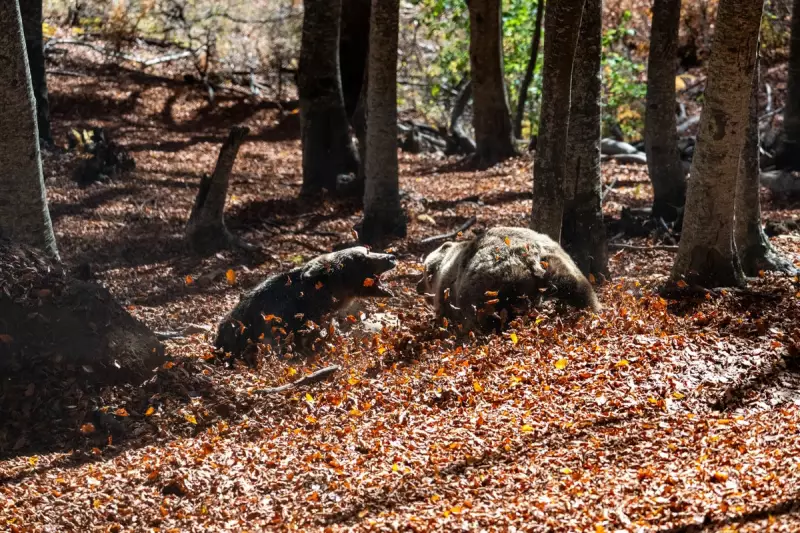
Farmers in northwestern Greece are facing an unprecedented challenge as the country's largest predator makes a dramatic return to the region. The remarkable recovery of brown bear populations has created a complex conflict between conservation success and rural livelihoods.
Livestock Losses and Growing Tensions
Anastasios Kasparidis, a farmer in Levea village, experienced this conflict firsthand when he discovered three of his sheep brutally mauled to death. Large paw prints around the scene confirmed his suspicions: a substantial bear had visited his property.
"It was a bear, a very big one, and they come often now," Kasparidis recounted. "I wasn't the only one, it struck elsewhere too." Another local farmer reported losing chickens and pigs to the increasingly bold predators.
To protect his remaining flock, Kasparidis has been forced to move his sheep into a pen near his house. "Because in the end I wouldn't have any sheep," he explained. "The bears would eat them all."
Conservation Success Story
Environmentalists celebrate what represents a significant conservation victory. Brown bear numbers have increased roughly fourfold since the 1990s, according to Professor Dimitris Bakaloudis of Aristotle University of Thessaloniki, who specialises in wildlife management.
The most recent survey by environmental organisation Arcturos estimates that up to 870 brown bears now roam the forests of northern Greece. Established in 1992, Arcturos provides sanctuary for rescued bears and wolves and has been instrumental in monitoring the species' recovery.
This resurgence isn't limited to bears alone. Wolf populations have also expanded significantly, now reaching the outskirts of Athens and spreading into the Peloponnese in southern Greece - areas where they hadn't been seen for decades.
Ripple Effects Through the Ecosystem
The recovery of these predators has been partly sustained by another population boom: wild boars. Professor Bakaloudis explained that multiple factors have driven boar numbers upward, including reduced hunting, milder winters, and cross-breeding with domestic pigs.
These boars, viewed by many as crop-destroying pests, have become commonplace in many parts of Greece. Sightings of a dozen or more trotting along sidewalks or rummaging through backyards no longer surprise residents.
The increased wildlife presence has inevitably led to more human encounters, with most people unfamiliar with how to behave during such incidents. This year has seen several serious encounters, including a child bitten by a wolf, an elderly man injured by a bear in his yard, and a hiker bitten by a bear.
Community Concerns and European Context
In Levea, a village of approximately 660 people, community president Tzefi Papadopoulou reported multiple bear encounters in October alone. "As soon as they heard a dog bark, they were ready to go out with the gun," she said of frightened residents.
Nearby Valtonera village, located 170 kilometres west of Thessaloniki, faces similar challenges. Community president Konstantinos Nikolaidis noted that wild boars, foxes, bears and wolves now regularly roam around or even inside the village.
"This has caused concern among all residents," Nikolaidis said. "It's now difficult for a person to walk around outside at night."
This situation mirrors broader European trends. In May, EU lawmakers voted to reduce protections for wolves across member states, representing a victory for farmers over environmentalists. The movement gained support from European Commission President Ursula von der Leyen, whose pony Dolly was killed by a wolf three years earlier.
Complex Causes Require Nuanced Solutions
Experts emphasise that multiple factors drive wildlife into human areas, not just population growth. Panos Stefanou, communications officer at Arcturos, cited habitat fragmentation due to wildfires, drought, food shortages in natural environments, and village depopulation making inhabited areas more attractive to bears.
Professor Bakaloudis outlined measures to keep wolves and bears at bay, including using lights around property, proper disposal of trash and dead livestock, and avoiding feeding strays. In exceptional circumstances, such as the wolf attack on a child in northern Greece, authorities may capture and remove the animal.
Stefanou cautioned against simplistic solutions, stating unequivocally: "Killing the animals is not what will solve the problem." As Greece navigates this complex balance between conservation and community safety, the experience offers lessons for other European nations facing similar challenges with recovering predator populations.





